|
Experience the Nature of West Africa - a Tour to Sierra Leone - Guinea
Accommodation
On our trip through Sierra Leone and Guinea we stay in hotels, guesthouses and campsites of different comfort. In Freetown we stay in a mid-range hotel providing 24-hour water supply and electricity by a generator. In River Number 2 and Banana Island we stay in basic guesthouses on the beach with en-suite rooms, but there is no hot water. The permanent camp on Tiwai Island is very basic with shared showers and toilets but good large permanent tents.
In Dalaba and Kindia we stay overnight in typical clean hotels with en-suite rooms, AC and/or fan. In Doucky we sleep in very basic huts for 4 people each. There are basic shared facilities (long-drop toilets and bucket shower). Bel Air is a newly renovated upmarket hotel.
Here is a selection of the hotels used on our tour:
|
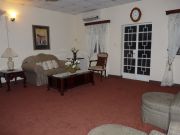
| Ericson Guesthouse, Freetown | |
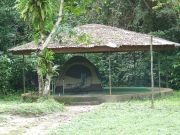
|
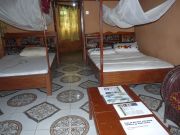
|
|
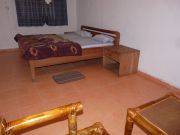
|
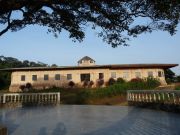
|
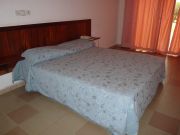
|
Airlines
Airlines with scheduled flights to Sierra Leone and Guinea include Air France offering two flights per week (Sunday and Wednesday) to Freetown via Paris and daily return flights from Guinea to Paris. Brussels Airlines has two scheduled flights per week (Monday and Thursday) to Freetown via Brussels and two return flights from Conakry to Ouagadougou via Brussels and two return flights per week (Friday and Monday) from Lomé to Brussels.
For further information regarding flights schedules, reservation, connection flights please consult the airlines’ websites: www.brusselsairlines.com and www.airfrance.net.
The itinerary of our group guided tours with fixed departure dates matches the Air France flight schedule. If you choose another airline there may be modifications to the itinerary and/or additional cost due to extra overnight accommodation and extra transfer expenses. If you book a tailor-made trip with us you can fly the airline of your choice. We will be pleased to provide you with a regarding your reservation.
Royal Air Maroc fliegt montags, mittwochs und samstags Freetown mit Zwischenstopp in Casablanca und hat täglich außer mittwochs Rückflüge ab Conakry Freetown via Casablanca.
Climate
Sierra Leone
The climate in Sierra Leone is tropical and wet all year round. The country has one rainy season from May to October and one dry season that runs from November to April. In the rainy season the relative humidity is high, it reaches up to 90%. Sierra Leone’s coast is one of the wettest areas in West Africa with an annual rainfall of more than 5000 mm. Average daytime temperatures rise to around 28°C to 30°C, at night temperature can drop to roughly 23°C. In the dry season temperature generally exceeds 30°C, the hottest months being February, March and April when average temperatures reach or top 35°C. In December and January the harmattan winds blow, bringing dust from the Sahara.
Guinea
Guinea has a typical tropical climate. There is one rainy season and one dry season, the length and intensity of which will vary depending on the region. The climate along the coast is hot and humid with average temperatures of about 25°C throughout the year. Rainfall averages 4000mm a year, reaching its peak in August and September.
The Fouta Djallon has a tropical mountain climate with temperatures averaging a comfortable 20 to 25°C. The can drop dramatically at night to 5°C. The relative humidity is low. The rainy season runs from June to October with an average rainfall of 1800 to 2000mm a year.
The climate in Upper Guinea is rather dry and hot. Average temperatures rise to 35°C. May is considered to be the hottest month of the year with temperatures exceeding 40°C. From November to February the harmattan winds arrive full of Saharan dust. The Upper Guinea region receives an average rainfall of 1200 to1500 mm a year.
Forest Guinea’s climate can be classified as subequatorial with temperatures averaging 24 to 28°C. The rainy season runs approximately nine months of the year, and the average annual rainfall is 2800mm.
Clothing
Light short-sleeved cotton clothing is recommended for the days and a long-sleeved shirt and trousers for the evenings which will help you to fend off mosquitoes and face the cooler temperatures in the mountains. In Guinea shorts and short skirts are ill-advised for women. It is also unusual for men to wear shorts in Guinea. In the rainy season you need a waterproof jacket and/or an umbrella. (see chapter “climate”). In some hotels there is a laundry service on offer, so you can get your washing done. As for footwear, you should carry with you a good pair of walking shoes for our hiking tours in Fouta Djallon and on Tiwai Island and a pair of sandals. Thongs are useful in shower and pool areas. Don’t forget your swimwear! You will have the opportunity to swim in the sea, relax on beautiful beaches and bathe in the pools of magnificent waterfalls
Communications
Sierra Leone
International and national calls can be made from post offices and hotels. The prefix for UK is 0044, for USA and Canada 001, for Sierra Leone 00232. In major cities you can make phone calls with your mobile phone, however, the coverage is not very good. For detailed information please contact your provider prior to departure. If you have a GSM phone and it has been „unlocked“, it is possible to buy a local SIM card for about 2 US-$ and buy top-ups.
Internet access is widely available in Freetown and prices not expensive, although connections are often slow. Outside Freetown, you will find only few internet cafés and they are more expensive than in Freetown.
Guinea
Landlines are in a bad condition and often not functioning. The prefix for UK is 0044, for USA and Canada 001, for Guinea 00224. As in many other African countries, the mobile industry in Guinea is booming, however, you will find a good coverage only in the urban areas and connections are often bad. For detailed information please contact your provider prior to departure. If you have a GSM phone and it has been „unlocked“, it is possible to buy a local SIM card for about 2 – 3 US-$ and buy top-ups. There are two providers in Guinea: Orange and MTN.
Internet access is only available in major cities, and prices not expensive, although connections are often slow or not working at all.
Electric Supply & Plugs
Guinea
220 volts alternating current. The power supply situation is very poor and unreliable all over the country, even in Conakry. Frequent power cuts occur. Guinea uses two-pin continental-style plugs, so you will probably need to bring along an adapter. Remember to charge your batteries wherever you have the opportunity. During our stay in Doucky there is no electrical power available at all. You will need to bring a good torch with you.
Sierra Leone
220-240V AC, 50 Hz. Sierra Leone's power supply facilities suffered damage during its civil war and have not been properly maintained since. As a result power supply situation is very poor and unreliable all over the country. Only bigger hotels in Freetown and in some bigger towns have a generator. Remember to charge your batteries wherever you have the opportunity. Sierra Leone mostly uses British-style three-pin plugs (D and G). If you need an adapter it is best to bring it with you as you may not find any in the shops in Sierra Leone. You will need to bring a good torch with you.
Food and drinks
In the itinerary we state which meals are included on each day.
Food included in the breakfast varies according to hotel standard. Most hotels serve bread, butter, jam, sometimes honey and processed cheese or omelette for breakfast. It also includes tea or coffee. Upmarket hotels usually serve buffet breakfast. Dinner we usually take in the restaurants of our hotels or in clean, thoroughly selected restaurants in town. In many places international cuisine is served.
Sierra Leone
Sierra Leone’s main staple is rice and, to a lesser extent, maize and cassava that is generally cooked until the root has turned into a paste. The dishes are served with spicy sauces usually containing meat or fish. The main ingredients of the sauces are leaves like cassava and sweet potato leaves, but also ladies‘fingers, groundnut and vegetables. Gari – grated cassava – is popular in Bo. Potatoes are also very popular.
The coast is great for delicious fish and seafood dishes. Here you will find prawns, lobster, crayfish or octopus, as well as barracuda, grouper and snapper on the menus.
Tap water should be boiled or filtered before you drink it. In all bigger cities you can buy mineral water in bottles. In the rural areas and villages homemade palm wine also known as poyo is sold everywhere. Soft drinks like Coca cola and Fanta are available throughout the country
Guinea
Guinea’s main staples are grains and roots like fonio, cassava, yams and taro. Rice dishes are also very popular including Riz gras consisting of rice cooked in a clear soup or in oil with tomato paste, onion and chilli. Maganyi is a typical rice dish from the coast served with meat or prawns. Most dishes are combined with spicy sauces including groundnut sauce, vegetable sauce, Sauce gombo made of okra and various green leafy sauces.
Topogie is a special sauce of the Toma people in the Forest Region made of cassava or sweet potato leaves cooked with egg-plant and okra and drowned in fatty red palm oil.
The coast is great for delicious fish and seafood dishes. Here you will find prawns, lobster, crayfish or octopus, as well as barracuda, grouper and snapper on the menus.
Meat dishes usually consist of beef, goat or chicken, although chicken rather consists of bone and muscle in Guinea.
Tap water should be boiled or filtered before you drink it. In all bigger cities you can buy mineral water in bottles. In the villages of the Forest Region and in the coastal areas homemade palm wine is on sold. Soft drinks like Coca cola and Fanta are available throughout the country. The common beer brands are Skol and Guiluxe.
Health
A Yellow Fever vaccination and certificate is a compulsory requirement for entry into Sierra Leone and Guinea (see visa requirements). You should always carry the certificate with you while being in Africa.
Immunisations against tetanus, diphtheria, polio and hepatitis A are recommended by the World Health Organization, regardless of your destination. For other vaccinations and prophylactic measures please consult your doctor, travel clinic or tropical medical bureau before departure.
Travel clinics:
UK
-
Berkeley Travel Clinic, 32 Berkeley St., London WIJ 8EL, Tel.: 020 7629 6233
-
Cambridge Travel Clinic, 41 Hills Rd, Cambridge CB2 1NT, Tel.: 01223 367362
-
-
-
Hospital for Tropical Diseases Travel Clinic, Mortimer Market, Capper St. off Tottenham Court Road, London WC1E 6JB, Tel. 020 7388 9600, www.thehtd.org
-
InterHealth Travel Clinic, 111 Westminster Bridge Road, London, SE1 7HR, Tel.: 020 7902 9000, www.interhealth.org.uk
-
USA:
-
Centres for Diesease Control, 1600 Clifton Rd., Atlanta, GA 30333, Tel.:(800) 232 4636 or (800) 232 6348
-
IAMAT, International Association for Medical Assistance to Travellers, 1623 Military Rd., 279 Niagara Falls, NY14304-1745, www.iamat.org
Canada:
-
IAMAT, Suite 1, 1287 St. Clair Av W, Toronto, Ontario, M6E 1B8, Tel.: 416 652 0137, www.iamat.org
-
TMVC, Suite 314, 1030 W Georgia St., Vancouver, BC V6E 2Y3, Tel.:888 288 8682, www.tmvc.com
For further health information visit following websites:
www.masta-travel-health.com
www.fitfortravel.nhs.uk
www.iamat.org
To prevent traveller’s diarrhoea, peel fresh fruits before eating them and avoid fresh salads and ice cubes in basic restaurants. Be careful and very selective when eating or drinking in street stalls and make sure that meat is always well cooked and plates and serving utensils are clean. Don’t drink hastily ice-cold drinks. Consult your doctor before departure for appropriate medication and rehydration mixtures.
The best prevention of malaria is to avoid being bitten. The evening wear clothes covering your entire body and use mosquito repellent. Sleep under a mosquito net and/or turn AC or fan on. For further prophylactic measures consult a specialist for tropical diseases.
Keep away from street dogs, monkeys and other mammals that could carry rabies. Avoid bathing in standing bodies of water because they are high-risk areas for bilharzia.
Literature
Travel guides:
West Africa, Lonely Planet, 7th edition, published Oct 2009
Sierra Leone, Bradt Travel Guide, 1st edition, published May 2009
Benin, Bradt Travel Guide, first published February 2006
The Rough Guide to West Africa, 5th edition, published June 2009
For those, who speak French:
Guinée, Le Petit Futé, 4th edition, 2010
Novels and biographies:
Heart of the Matter, Graham Greene, Vintage 2001
Last Harmattan of Alusine Dunbar, Heinemann International, 1990
Civil war:
A Long Way Gone; Memoirs of a Boy Soldier, Ishmeal Beah, Sarah Crichton Books 2007
Soldiers of Light, Daniel Bergner, Penguin Books, 2005
Money
Sierra Leone
Sierra Leone’s currency is the leone (SLL). Exchange rates are 1 € = 5,560 SLL, 1 $ = 4,415 SLL and 1£ = 6,930 SLL (as of July 2012). Notes are in denominations of 10,000, 5,000, 2,000 and 1,000; coins come in 500, 200, 100 and 50. Please note that finding change can be very difficult at times, particularly in small shops, restaurants, taxis and street stalls, so you should always have a good supply of cash money in small denominations or coins.
You can change cash money in banks, some hotels and foreign exchange bureaus in Freetown and other major cities. Normal banking hours of the branches of Rokel Bank and Sierra Leone Commercial Bank are from Monday to Friday from 08.30 to 15.30, Sierra Leone Commercial Bank opens on Saturdays from 09.30 to 13.30. However, banks exchange money usually at a lower rate than foreign exchange bureaus. In foreign exchange bureaus all widely used currencies like euro, US dollar, Swiss franc, British Pound Sterling are easy to be exchanged. Please note, that only new dollar bills (with the “big heads”) are exchanged. “Small heads” or bills of 1996 or before or one-dollar bills won’t be accepted. The larger the denomination, the better the rate. International credit cards are practically not accepted, you cannot use them as a means of payment and there are no international ATMs in Sierra Leone to withdraw money. Rokel Commercial Bank in Freetown with its branches in Makeni, Bo, Kono and Kenema is the only bank to give you cash advance on your credit card. You don’t need your PIN code but will need your passport. However, this procedure is time consuming, and commission is very high. Travellers’ cheques are accepted, but only in banks. Commission is extemely high and you will get a low exchange rate. You will be asked to produce both your passport and the receipt you get from your bank when purchasing them.
Guinea
Guinea’s currency is the Franc Guinéen (GNF). Exchange rates are $1 = 7,300 GNF, £1 = 11,450 GNF, €1 =. 9,190 GNF (as of July 2012). Notes are in denominations of 10,000, 5,000, 1,000 and 500 GNF, coins come in 100, 50 and 25. Please note that finding change can be very difficult at times, particularly in small shops, restaurants, taxis and street stalls, so you should always have a good supply of cash money in small denominations or coins.
Normal banking hours are from 08.00 to 13.00 and 14.30 to 16.30, Mondays through Fridays. You can change cash money in banks, some hotels, foreign exchange bureaus and in markets. The most widely accepted currencies to be exchanged are euro, dollar and franc CFA of the neighbouring countries of Mali and Ivory Coast International credit cards are practically not accepted, you cannot use them as a means of payment and there are no international ATMs in Guinea to withdraw money. EC Maestro card is an absolute no-go everywhere in the country. While travellers’ cheques offer a greater security, changing them can be time consuming and commission is very high. You will be asked to produce both your passport and the receipt you get from your bank when purchasing them. The cheques have to be issued in euro or dollar. It is very difficult to convert francs GNF back into hard currency upon departure.
Photography
Both countries are real treasure troves for passionate photographers. Whether the magnificent waterfalls in Fouta Djallon, the picturesque Tiwai Island or the chimps of Tacugama: there are countless photographic subjects.
Before you snap people please ask permission. A small friendly conversation can help you to break the ice and win your subject’s sympathy. Taking pictures is not allowed inside the museums. It is strictly forbidden to take pictures of military buildings and people wearing uniforms, airports, dams, bridges, power plants, police stations, control posts along the roads and border posts!
Safety
The danger most likely to affect a tourist is pick-pocketing, particularly in busy markets, bus stations, in crowds in the streets or in shared taxis. Bag snatchers are few, but can occasionally strike, speeding past on mopeds.Do not wear expensive jewellery or carry large amounts of cash or expensive items such as cameras. You should keep belongings close when walking down streets. We recommend you to keep your documents, cash money, credit card and cheques in a skin-hugging hidden money-belt or a button-up chest pocket. Always travel with photocopies of your documents and keep them in a separate bag.
Avoid walking around the streets at night, especially alone.During late evening or around/after midnight, we recommend you to use a taxi.
For up-to-date information and safety and security advice about your destination please check your government’s travel advisory: www.fco.gov.uk, www.travel.state.gov, www.voyage.gc.ca
Sierra Leone
In case of emergency please contact your embassy or representation in Sierra Leone:
For UK:
British High Commission
Mr Ian Noel Hughes (High Commissioner)
6 Spur Road
Freetown, Sierra Leone
Switchboard: +232 (0) 768025634, 72200192,76541388, 76541386, 76912606
+232 (0) 76859117 (for emergencies outside office hours
Fax: + 232 22 228169 or 232 22 232070
http://ukinsierraleone.fco.gov.uk/en/
Office hours: Monday toThursday: 0800-1630, Fri: 0800-1300
For USA :
Embassy of the United States of America, Consular Section
Southridge-Hill Station
Freetown, Sierra Leone
Telephone: +232 76 515 000 ext. 5086, 5084, 5080, 5085
e-mail: consularfreetown@state.gov
www.freetown.usembassy.gov
The Consular Section in Freetown offers services to both American citizens and non-Americans
Hours of operation: Mondays to Thursdays 8:00am – 5:00pm, Fridays 8:00am – 12:30pm
For Canada :
All inquiries and emergency-related requests should be directed to the High Commission of Canada in Accra, Ghana.
Street Address:
42 Independence Avenue
Accra, Ghana
Sankara Interchange (Ako Adjei Overpass)
Telephone: 011 (233) 30 2211 521
Facsimile: 011 (233) 30 211 523 / 2773 792 / 2211 524 (visas)
e-mail: accra@international.gc.ca
website: www.canadainternational.gc.ca
Postal Address
High Commission of Canada
P.O. Box 1639
Accra, Ghana
Hours of operation: Monday to Thursday: 07:30 – 16:00, Friday: 07:30 – 13:00
Guinea
In case of emergency you can contact your embassy or representation in Guinea:
For UK:
British Embassy in Guinea
BP 6729, Conakry
Republic of Guinea
Tel.: +224 63 35 53 29
Fax: +224 63 35 90 59
Office hours: 8.00 to 16.30, Monday to Friday, 8.00 to 13.00 on Fridays
For USA:
The U.S. Embassy is located in Koloma, Conakry, east of Hamdallaye Circle at the following address:
American Embassy Conakry
P.O. Box 603
Transversale No. 2
Centre Administratif de Koloma
Commune de Ratoma
Conakry, Republic of Guinea
Telephone: +224-65-10-40-00
Fax: +224-65-10-42-97
In order to request services for American Citizens, please contact the Consular section:
Telephone: +224-67-10-43-11
E-mail: ConsularConakr@state.gov
www.conakry.usembassy.gov
For Canada:
You can obtain consular assistance and further consular information at the following address:
Consulate of Canada in the Republic of Guinea
Descente Plage Rogbané, Taouyah Corniche, Conakry, Guinea
Postal Address: P.O. Box 1833
Conakry, Guinea,
Tel.: +224 60 236022
After hours tel.: cell +224 64 448117
Fax: +224 60 236022
E-Mail: laprade@yahoo.com
The Embassy of Canada in Dakar, Senegal, has consular responsibility for Guinea. The address is as follows:
Embassy of Canada in Senegal
corner of Galliéni and Amadou Cissé Dia Streets
Dakar, Senegal
Postal Address: P.O. Box 3373, Dakar, Senegal,
Tel.: 221 33 889 4700
Fax: 221 33 889 4720
E-Mail: dakar@international.gc.ca
Internet:http://www.senegal.gc.ca
Time zone difference
Sierra Leone’s and Guinea’s time zone is UTC/GMT + 0. As they do not observe daylight saving time they are one hour behind in summertime
Tipping
Although entirely voluntary, tipping is a recognized part of life in Africa. In the more well-to-do restaurants you can tip 5 – 10% if you were satisfied. For hotel tipping guidelines are as follows: for porters 2000 GNF for one piece in Guinea and 1000 to 2000 SLL in Sierra Leone, for housekeeping 4000 GNF per person per night in Guinea and 2000 to 3000 SLL in Sierra Leone. At your discretion you might also consider tipping your driver, tour guide and local guides in appreciation of the efficiency and service you receive.
Visa requirements
You may choose to use a visa service or send your application to the representations listed below.
Please note, that for this trip you need to have 4 empty pages in your passport.
Please note that a Yellow Fever vaccination and certificate is a compulsory requirement for entry into both countries (see chapter “Health”). The certificate is often checked upon arrival.
All visa information is subject to change. You should confirm all visa related issues with the relevant embassy or consulate prior to departure.
Sierra Leone
Visas are required by all nationalities. Passports valid for a minimum of six months beyond date of departure are required by all. Visas are issued in countries with Sierra Leone representation.
The addresses are as follows:
For UK residents:
Sierra Leone High Commission
41 Eagle Street
Holborn, London, WC1R 4TL
Tel.: +44 (0) 207 404 01 40; fax: +44 (0) 207 430 9862
E-Mail: info@slhc-uk.org.uk
www.slhc-uk.org.uk
All applications must be accompanied by the following:
Applicant’s passport (must be valid for at least six months)
One recent passport-sized photograph
Application fee: £50 for a single visa, £75 for a six-month multiple entry visa (please note that application fees are non-refundable)
Documents, such as invitation or business letters, evidence of hotel reservation (for tourists)
Registered, stamped, self-addressed envelope for postal applications
Approved consular request takes a minimum of 3 working days before collection.
For the United States:
Embassy of Sierra Leone in the United States
1701 19th Street NW
Washington DC 20009-1605
Tel.: +1 202 939 9261, 62, 63 (Consular service)
info@embassyofsierraleone.net
www.embassyofsierraleone.net
Office hours: 10.00am to 3.00pm Monday to Friday
All applications must be accompanied by the following:
Completed visa application form
One recent passport-size photograph (less than six months old)
A passport valid at least one year before the date of expiration
Copy of travel itinerary or round trip ticket
Registered, stamped, self-addressed envelope for postal applications
A valid and up-to-date international certificate of vaccination (yellow fever)
Visa fee: US citizens are eligible for up to 3 years multiple entry visa, the is $ 160, payment in money order or cashier’s cheques payable to the Embassy of the Republic of Sierra Leone. Personal cheques are not accepted.
The standard visa is issued within 3 business days.
For Canada:
There is no Embassy of Sierra Leone in Canada. Canadian passport holders are required to contact the Embassy of Sierra Leone in USA (see above).
Visa fee for a 6-month visa is 75 US-$.
Guinea
Visas are required by all nationalities. Passports valid for a minimum of six months beyond date of departure are required by all. Visas are issued in countries with Guinean representation.
The addresses are as follows:
For UK residents:
Consulate General for the Republic of Guinea
258 Belsize Road
London
NW6 4BT
Opening hours: 10.00 to 13.00.
Due to the small size of the consulate processing times may vary
Application requirements for a tourist visa:
-
2 completed visa application forms
-
Valid passport (original)
-
2 passport-size photographs
-
Copy of flight tickets
-
Hotel reservation
-
Payment of visa fees: single entry visa £49, multiple entry visa £180
For US citizens:
Embassy of the Republic of Guinea in the USA
2112 Leroy Place, NW, Washington, DC 20008, USA
Tel: (202) 986 4300.
Fax: (202) 986 4800.
www.guineaembassyusa.com
Office hours: Monday to Friday 9.30am to 4pm
Visa Requirements
-
A valid passport
-
Two completed application forms (can be downloaded from the internet site);
-
Two passport-size pictures
-
Copy of the Yellow fever vaccination certificate;
-
A letter stating the purpose of your trip to Guinea;
-
Fee paid with money order only ($100 for three months and $200 for six months to one year period and multiple entry);
-
Rush visa for the same day or next days is charged at twice the regular fee;
-
A self-stamped addressed envelope to return your passport;
The visa can be obtained within 72 hours.
For Canada:
Embassy of the Republic of Guinea in Canada
483 Wilbrod Rd.
Ottawa
Ontario K1N 6N1
Tel. +1 613 789 8444 or 613 789 3428
fax: +1 613 789 7560
www.ambaguinee-canada.org
All applications must be accompanied by the following:
-
Three completed visa application forms
-
Valid passport (original)
-
Three passport-size photos
-
A letter stating the purpose of your trip
-
Visa fee: single entry visa 100 CAN $, multiple entry visa 150 CAN $, personal cheques are not accepted, fee to be paid with money order
-
Registered, stamped, self-addressed envelope for postal applications.
Visas are issued within 48 hours.
What to take
Passport
Air ticket
International yellow vaccination card
Photocopies of your documents (it’s good to keep them in a separate bag)
Cash money, credit card
Hard top suitcase or tear resistant travel bag + day bag
Sleeping bag
Protective cover for your suitcase
Swimwear
A pair of flip flops (for shower and pool etc.)
A pair of sandals
Comfortable footwear, non-slip hiking boots
Long lightweight trousers, shorts, long-sleeved shirt for the evening, light thin cotton clothing
Sunhat and sunglasses
Suncream
Umbrella and/or waterproof jacket
Towel
Toilet paper, tissues, wet wipes
Torch with spare bulb and batteries
Swiss knife
Personal first-aid kit
Insect repellent
Photographic equipment, memory cards/film rolls, batteries
Binoculars
What you should know before you go
… Sierra Leone and Guinea are wonderful countries to visit, but remember that Africans have a different perception of time. A trip through West Africa requires a high degree of flexibility, patience and tolerance, western standards regarding service, punctuality, comfort and hygiene cannot be applied here. Although we thoroughly choose our vehicles and use only vehicles in good condition, flat tires or other car breakdowns can happen. The road conditions in African countries can change unexpectedly due to heavy rainfalls requiring a detour or bridges can suddenly become impassable. We do our utmost best to ensure a smooth journey but please understand that delays may occur. Technical defects or service inconveniences in the hotels such as the lack of towels can often be rectified within a few minutes. In case of any inconvenience please contact your tour guide!
Experience the Nature of West Africa - back to the itinerary |